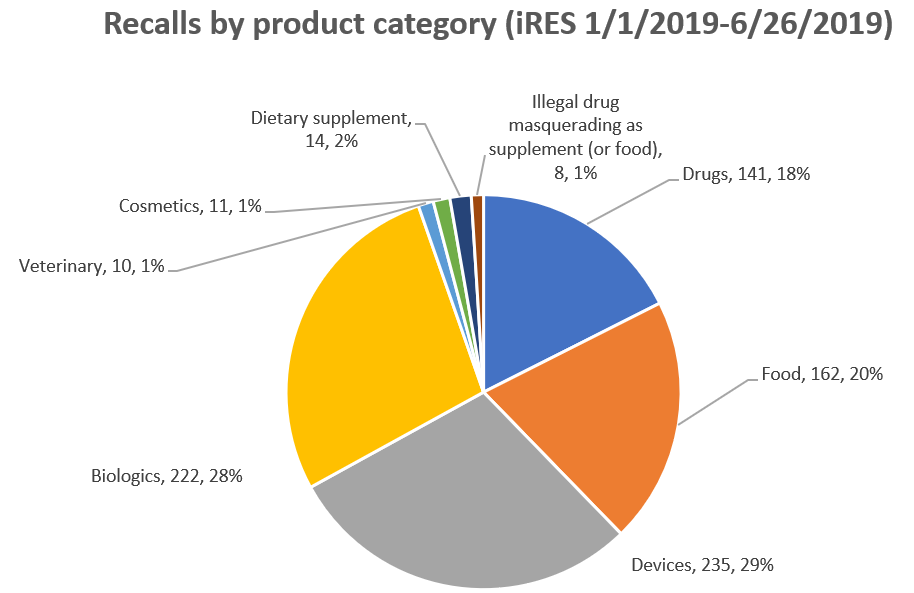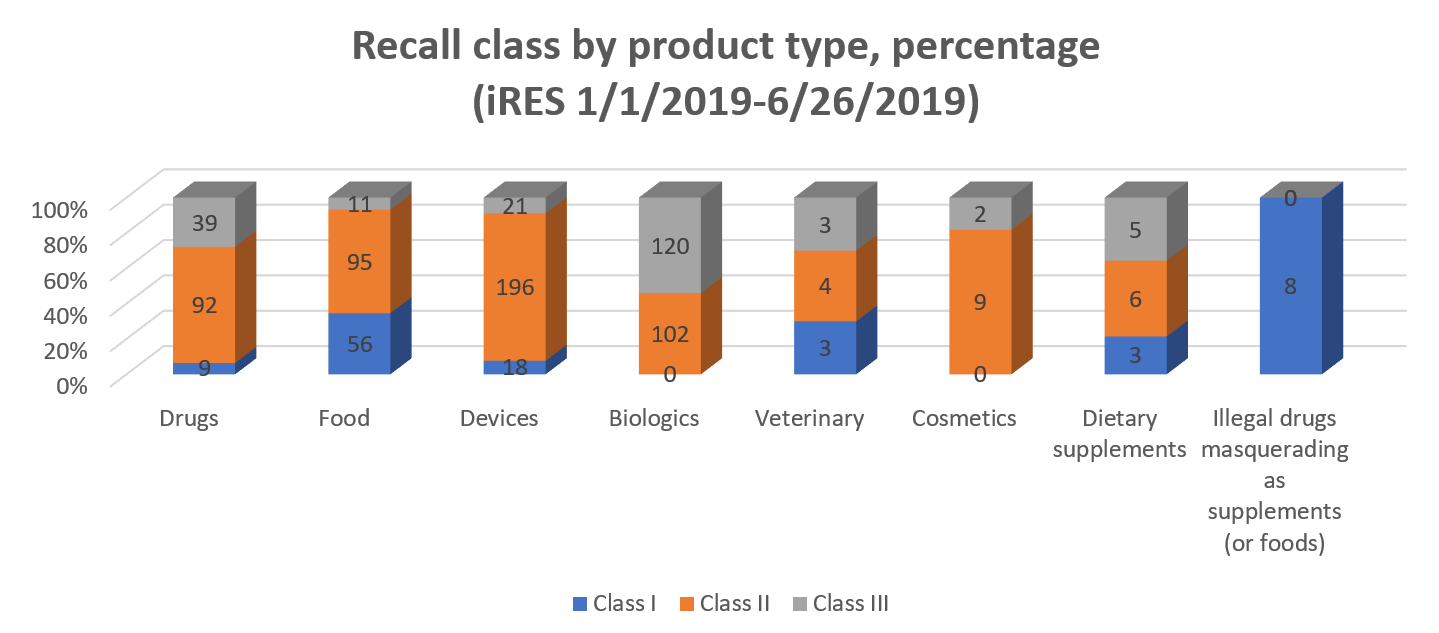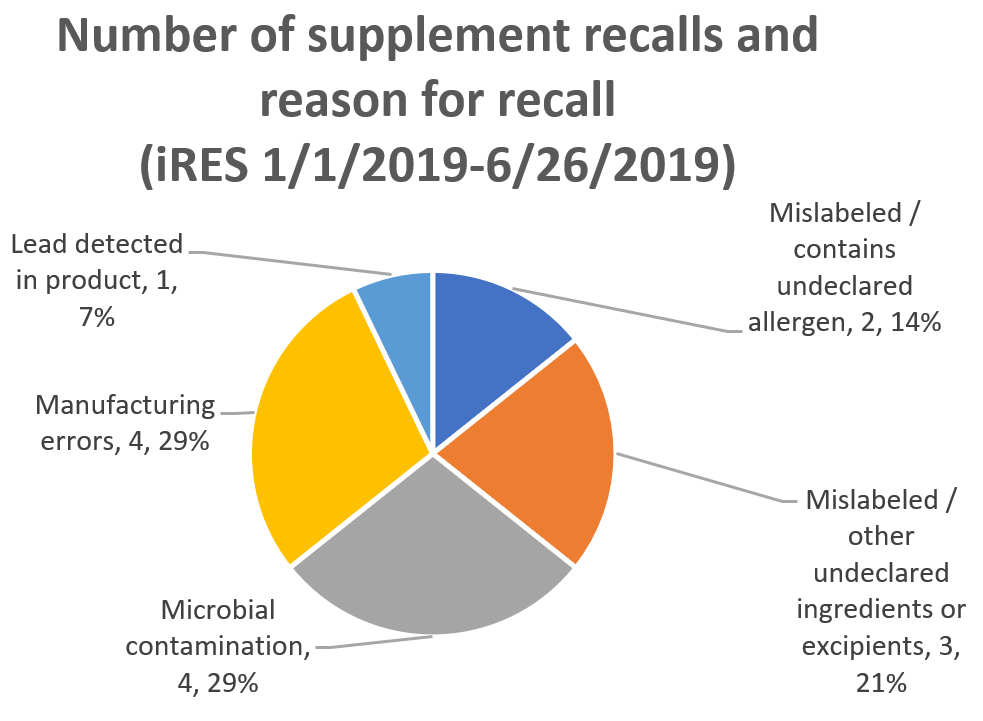Recall data from the Food and Drug Administration (FDA) shows that 14 of 803 (1.7 percent) recorded recalls initiated in 2019 involved dietary supplements, and among these, three were Class I recalls (the most serious recall class), according to an article published in the August 2019 AHPA Report.
“These recall data provide additional evidence of the overall safety of the dietary supplement class,” said AHPA Chief Information Analyst Merle Zimmermann, Ph.D. “AHPA also regularly reviews other dietary supplement safety resources, including mandatory serious adverse event reports and recorded observations from FDA inspections, and the results suggest that current supplement laws and regulations are working effectively to protect consumer safety and ensure a marketplace of high-quality, safe products.”
FDA is responsible for the safety of most foods, dietary supplements, drugs (both prescription and non-prescription OTC drugs), biologics, medical devices, radiation-emitting products, cosmetics, veterinary products, and tobacco products. These regulatory activities include tracking and reporting on product recalls. Reports documenting these recalls are regularly distributed by FDA and are available to the public through the internet Recall Enterprise System (iRES). AHPA’s analysis is based on iRES data released by the agency through June 26, 2019, which recorded 803 recall events initiated in calendar year 2019.
 Of the 803 recalls recorded in iRES in this period, 29 percent were recorded for medical devices and 28 percent for biological products. Drug products accounted for 18 percent of these recalls and 20 percent were for conventional foods. AHPA staff identified 1.7% of recalls involved dietary supplement products.
Of the 803 recalls recorded in iRES in this period, 29 percent were recorded for medical devices and 28 percent for biological products. Drug products accounted for 18 percent of these recalls and 20 percent were for conventional foods. AHPA staff identified 1.7% of recalls involved dietary supplement products.
FDA assigns voluntary recalls a classification based on a health hazard evaluation
- Class I -- A reasonable probability that the use of, or exposure to, a violative product will cause serious adverse health consequences or death
- Class II -- Use of, or exposure to, a violative product may cause temporary or medically reversible adverse health consequences or where the probability of serious adverse health consequences is remote
- Class III -- Use of, or exposure to, a violative product is not likely to cause adverse health consequences
Eleven of the 14 dietary supplement recalls (nearly 79 percent) from the reviewed period in 2019 were classified as Class II or Class III, and three (21 percent) were identified as Class I.
Among the dietary supplement recalls conducted in 2019 and classified by FDA between January 1, 2019, and June 26, 2019, the most common reasons for conducting a recall were the risk of microbial contamination (29%, 4 cases) or mislabeling, including incorrect amounts of ingredients and omitted excipients (21%, 3 cases), or the presence of unlabeled allergens, (14%, 2 cases).
During this same period, 162 recalls were conducted involving non-dietary supplement food products. Of these recalls, 45% (73 cases) regarded undeclared allergens or the presence of sulfur or sulfites and 26% (41 cases) were related to microbial contamination, manufacturing errors (usually involving foreign material in the product) were seen 16% of the time (26 times), and 7% (11 recalls) were based on mislabeling.
Among the 803 recalls analyzed, there were seven cases where FDA indicated that the recalled products were illegal drugs masquerading as dietary supplements and one where the illegal drug was labeled as a conventional food. All of these recalls were classified by FDA as Class I recalls, and have been separated from the other categories above. These illegal products are archived on AHPA’s Keep Supplements Clean website (keepsupplementsclean.org), a free resource to inform consumers, the dietary supplement industry, and other stakeholders of issues related to illegal, tainted products with false labels. In each of these cases, products were labeled as either conventional foods or dietary supplements, but when tested they were found to contain undeclared illegal drug ingredients. The regulated supplement industry continues to vocally support FDA’s using its existing authority to fully enforce current laws and regulations to remove these illegal products from the market.